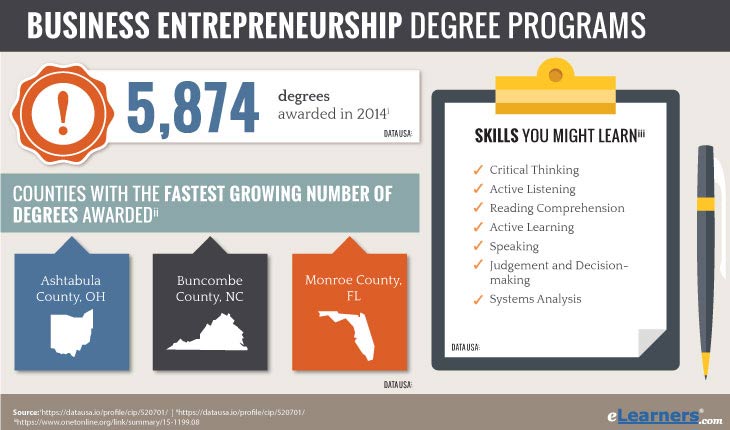Sponsored Online Programs Available
Online Entrepreneurship Degree Programs
Online entrepreneurship degree programs can vary from school to school. Lucky for you, entrepreneurship comes in all shapes and sizes, too. But one thing the great ones all seem to have in common … Media requests for "meaning of life statements" galore. That's because many of us believe Entrepreneurs seem to have the secrets to happiness in hand, after all they have what seems like the ultimate luxury - being their own boss.
Want your BOSS tee shirt to actually mean something beyond lamest Halloween costume ever? Then you gotta mobilize and get Entrepreneurial. For many that starts with earning an online entrepreneurship degree.
You're Not Alone!
According to the most recent Gallup “State of the Global Workplace” study, half of all employees in the United States have quit jobs at some point in their careers in order to get away from their bosses.
About Online Entrepreneurship Degree Programs
For those who create their own business, autonomy may be the greatest reward[i] but there's another side to that coin. Sure, it's all about you and your vision… that also means you gotta be the one to build the dream. So, if that brand of hard work appeals to you, Entrepreneur just might be your middle name. A degree program designed for Entrepreneurs certainly may help ease you on down that road too. Best to figure out your passion and then see what follows.
That's because all industries have their version of Entrepreneurship. What Bill Gates is to software, Mark Cuban is to sports and Warren Buffet is to bank bonanzas. This Captains of Industry list could roll infinite because every business has to start somewhere and with someone in particular. Why not me? Why not you? All of us future Entrepreneurs just gotta decide which ship to captain and start steering ourselves in that direction.
What Is a Business Entrepreneur?
An entrepreneur is usually a sole proprietor, a partner or majority shareholder who organizes or operates a business (or businesses). Business entrepreneurs may have an idea they want to launch into a small business. Rather than working as an employee, they want to take the risks and rewards of initiating a business venture. Typically seen as leaders and innovators, a successful entrepreneur takes a new project and makes decisions that lead to economic profit.
You Say You're a Grower?
The University of Northern Michigan started a degree program in 2017 for Medicinal Plant Chemistry. There are two tracks within the program, one Bio-Analytical in focus and the other Entrepreneurial.
In other words, magical plants are hitting the syllabus these days. It's just one example of how pretty much any interest has potential for a future business plan with some education and legality behind it.
What Motivates You?
The State of the Workplace Gallup study also uncovered that workers who believe their opinions count at work feel more invested in their job. Their data suggests that without such opportunities, workers tend to doubt their ability to get ahead by working hard. This can thus hinder motivation and productivity. Higher levels of agency and independence also promote new ideas as employees feel empowered to pursue Entrepreneurial goals.
The study thus links Entrepreneurial attributes with empowering feelings and independence along with productivity. This makes sense in light of two main attributes shared by Entrepreneurs. They're self-employed and business owners. Of course not all self-employed workers are Entrepreneurs and not all business owners either but all Entrepreneurs are both of those. This matters because we have Bureau of Labor Statistics data for these groups of self-employed and business owners.
In fact, the BLS often talk about them as a singular group, separated with only the difference of being incorporated or unincorporated. The simply self-employed are more often unincorporated. They also don’t employ others as much. While the incorporated are more often business owners as well as self-employed. They also are more likely to employ others as well as themselves.
It's All About the Self-Employment
In 2015 15 million people were self-employed in the US, including those both incorporated and not. This represents about 10% of total US employment. Around 9.5 million of them are unincorporated. So, that means about 6o% of the self-employed are unincorporated. [ii]
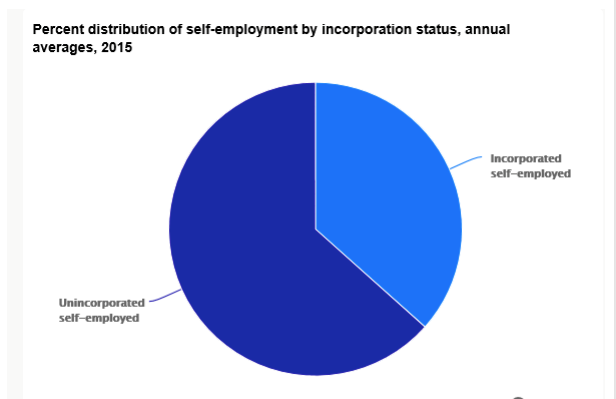
Incorporated and Unincorporated - What's the Diff?
The biggest difference between incorporated and not incorporated self-employment and business ownership lies in employing others. 41% of the incorporated have paid employees while only 14% of the unincorporated do.
OK… But How Big a Diff?
There were 2.3 million incorporated self-employed business owners with paid employees in 2015. 52.1 percent of them employed 1 to 4 workers and 12.5 percent had 20 or more employees. In other words, they’re kind of a big deal.
Speaking of Big Deals
Bill Gates, Richard Branson, and Warren Buffet, 3 of the richest guys out there each individually said true success has little to do with the mighty dollar. The trio all say success is really about helping make others happy.
We look to Entrepreneurship for answers to big questions like "What is Success?" because they represent the captains of our culture. Simply put, they’ve got big bucks but just like us - weren't born with them. In the 2016 list for 1,826 of the world's richest people, most (1,191) reached their financial peak as self-made Entrepreneurs. We're impressed for good reason because those are truly exceptional peaks, Gates could very well the world's first trillionaire, for example. If he can’t define "success" for our capitalistic, money-lovin' society - who can?
Well, turns out it's not just the big guys. We can also learn from the startups and even the smallest guy and gal enterprises offer valuable lessons. Mom and pop shops out there may offer wise advice. They're in the thick of it. And it may even be easier to listen to them than to your actual mom and pop. After all, even the most successful businesses have to start somewhere.
Bat Man - A Passionate Woodsman (Case Study)
A small time Maine carpenter with a passion for baseball bats turned his side gig into a $2 million business in only six years; with a staff of just 11 employees! His Dove Tail Bats are a hit with some of the biggest names in Major League baseball, from the Yankees to the Angels.
For this Yankee Entrepreneur the key to building his business began with creating the best bat. It started with lumber for him. He found out that slow-growing wood works best for bats because they develop a sublime balance of elasticity and stiffness. So, the Maine woods was where he started his particular venture. We all start somewhere.
One smart place anyone can start is educating yourself. Entrepreneurs can be found at all educational levels. For instance, in 2015 the incorporated, self-employment rates were highest for those with a professional degree at 12%. The second highest were those with a doctoral degree - 8.4%. In contrast, the incorporated self-employment rate for people with less than a high school diploma was much lower, at 2.1%. These numbers may not be particularly surprising given what being your own boss entails. Education may be able to help students locate our strengths in order to leverage them - the very stuff of Entrepreneurial gusto!
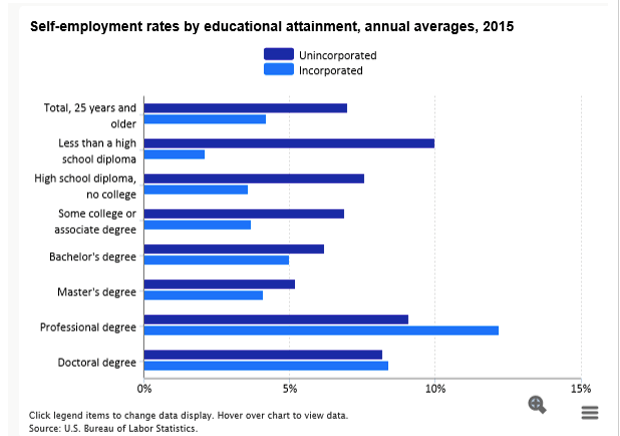
Youth Ain't All That [iii]
When it comes to Entrepreneurship, the longer a business is around, the bigger and more profitable it will likely become. More importantly, it's also more likely to succeed long term. Older establishments—those more than 10 years old—employ 71% of total private sector jobs, while those 4 to 10 years old accounted for 18%, and businesses less than 4 years old accounted for 11% of employment.
So, when it comes to starting your own business, the rules go against the typical unfairness workers tend to face as they age. Turns out, the younger a company, the greater chance it will fail. We know failure means business closure but success can be harder to define. We know the billionaires think it's about making others happy (yawn). Many think it’s all about dollar bills, ya'll. Still…
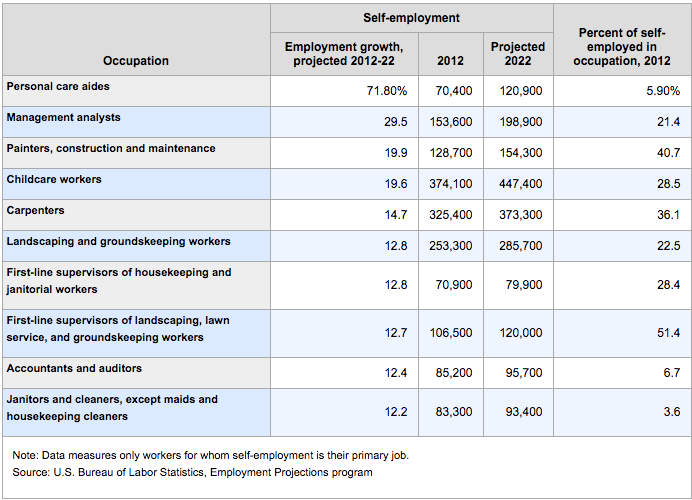
There are other measures of success, such as viability over time; and when it comes to small business startups, some industries seem to stand a better chance than others. Health Care stays consistently on top when it comes to this aspect and that shows even when it comes to the self-starters in this industry.
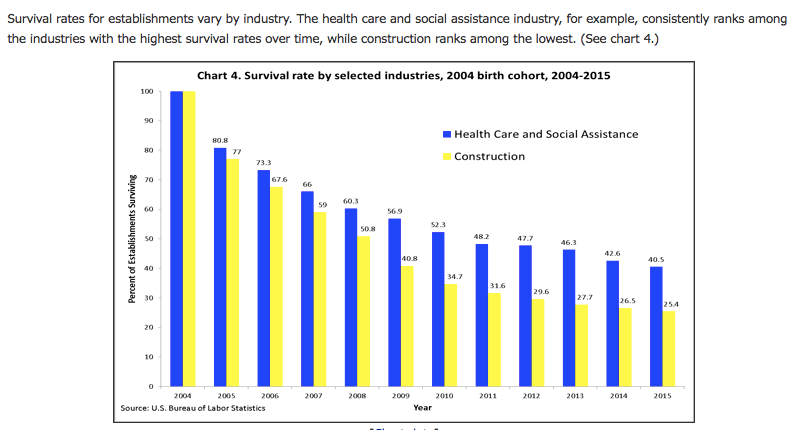 [ii]
[ii]
For example, when it comes to individual occupations that are particularly well-suited for self-employment, personal care aides have both high employment levels and fast projected job opportunities. Occupations with this combination of independence and may offer strong employment opportunities. The chart below shows how personal care aides exceed all other self-employed occupations in the category of projected growth. They stand heights above the rest at nearly 72% while the next highest is far below at nearly 30%. So, clearly some passions have better projected growth for self-employment than others, with personal care leading the pack.
.png)
Work to your Strengths After Earning an Online Entrepreneurship Degree
No matter what industry you choose, it's best to explore and take advantage of your strengths. The Gallup State of the Workplace study also found that workers who use their strengths on the job are more likely than others to be intrinsically motivated by their work—simply because it feels less like work to them.
Imagine a career where you can be your own boss and it doesn't even feel like work… No wonder it seems like Entrepreneurs might be able to tell us the meaning of life! Not only that but there's also a correlation between using your strengths on the job and productivity. In a study of almost 50,000 business units in 45 countries, Gallup researchers discovered that work groups that received strengths interventions saw sales increase by 10% to 19% and profits by 14% to 29%, compared with control groups.
Set Your Own Salary
So, how do you want to define success? Being your own boss sounds promising, of course. But when you also consider that this means setting your own salary as well… it may start to sound even better. The Bureau of Labor Statistics defines their terms carefully and even have a page called "Concepts and Definitions" on their website. There they explain terms and concepts they use regularly including the idea that Business Owners are "Individuals who set their own pay". [vi]
When you're the boss, you decide your worth to the company. Then your company's overall contribution to the community shares that worth with the world. Some of that may seem immeasurable but it can be measured in many ways, including the employment you provide. So, startups are a crucial part of the U.S. economy and it shows. Just look at the map below to see where startups make the biggest contribution in the country.
DID YOU KNOW?
5,874 Entrepreneurial studies degrees were awarded in 2014[i]
.png)
[vii]
No matter where or what your dream may be, there's possibility out there that you may try to make it into a business. After all, every business had to start first as an idea in somebody's head. Why not your head? Whether you think success is about: making other people happy, being your own boss, employing people, growing and selling recently legalized magical plants, setting your salary, or making bats for major leaguers, entrepreneurship is taking people there.
Business Entrepreneurship vs. Business Administration
At whatever level of education, the specifics of marketing, accounting, management and strategic planning might distinguish an online degree in entrepreneurship from a general business administration degree.
- Marketing: Whether in the form of personal promotion, branding, web-site development or social media, understanding how to market a business venture or an idea is an important part of business entrepreneurship.
- Accounting and Finance: Entrepreneurs need to understand concepts from general financial record keeping to forecasting profitability and budgeting, basic knowledge of accounting and finance for small businesses.
- Management: As a business leader, learn how to manage a team of employees, and understand basic business management concepts as they apply to developing a business
- Strategic Planning: If you have an idea for a small business venture, you need to explore not only where you hope your business will go, but also how to make decisions that support this growth, understand risk and create a strong internal framework.
What Might I Do with an Online Entrepreneurship Degree?
Aside from potentially bringing your own product to market, graduates of online entrepreneurship degree programs might pursue a variety of career paths. Of course, if you have an idea of your ideal occupation, you should spend some time researching the education recommended for achieving your goals. Here are a few possible careers that might stem from an entrepreneurship major:
- Marketing Manager
- Business Development Managers
- Business Continuity Analyst
- Leadership Development Managers
- Management Analysts
- Top Executives
Types of Online Degree in Entrepreneurship Programs
Offered as associates, bachelors, masters, MBA and doctorate levels, an online degree in entrepreneurship prepares individuals to develop, market, and manage the business operations associated with owning and operating small businesses.
Online Entrepreneurship Associates Degree Programs
Business entrepreneurship associates degree online degree programs are often designed to help current small business owners and future entrepreneurs develop the skills, knowledge and abilities needed to potentially turn their business dreams into reality. Typically, 2-year (full-time) degrees, these programs might cover foundational business skills such as accounting, managing and marketing with the focus on application to build and grow a small business.
Online Bachelors in Entrepreneurship Degree Programs
Online Bachelors in entrepreneurship degrees are often 4-year (full-time) programs designed to help students gain more insight into business development, business communications and management theories. The bachelor’s degree is the entry-level education for most management occupations (listed above) and a prerequisite for graduate school, so pursuing an online bachelor of business entrepreneurship might provide a solid background for future endeavors.
Online Masters in Entrepreneurship Degree Programs
Online Masters and MBA entrepreneurship degree programs might prepare graduates to enhance or initiate business opportunities. Graduate level courses might focus on increasing company efficiency, productivity and profitability. While some online entrepreneurship Masters degrees may take about 2-years to complete, there may be options for more accelerated or self-paced programs.
Online Entrepreneurship PhD Programs
Online Doctor of Business Administration or PhD in entrepreneurship might offer those with a pioneering spirit the opportunity to learn and research advanced concepts. From identifying market opportunities to managing risk and change within organizations, both the PhD and DBA are terminal business degrees.
Get Matched Today
These fascinating questions we have discussed here (and more!) are explored in Entrepreneurial Degree Programs at all levels. Click around the relevant links here at eLearners.com and get matched to the perfect program for you. It's immediate, easy, and free. Because these schools offer Entrepreneurial study at every level, we can match you to the perfect degree for your particular dream. You're in the right place to get started right away.
[i] bls.gov/careeroutlook/2014/article/self-employment-what-to-know-to-be-your-own-boss.htm [ii] bls.gov/spotlight/2016/self-employment-in-the-united-states/pdf/self-employment-in-the-united-states.pdf [iii] bls.gov/opub/ils/summary_10_09/younger_older_business_establishments.htm [iv] bls.gov/bdm/entrepreneurship/entrepreneurship.htm [v] bls.gov/oes/current/oes399021.htm [vi] bls.gov/opub/hom/ors/concepts.htm [*] datausa.io/profile/cip/520701/ | other sources: onetonline.org/link/summary/11-2021.00 | onetonline.org/link/summary/13-1199.04 | onetonline.org/link/summary/13-1199.04 | onetonline.org/link/summary/11-1011.00 [vii]census.gov/library/visualizations/2016/comm/startups-jobs.html


